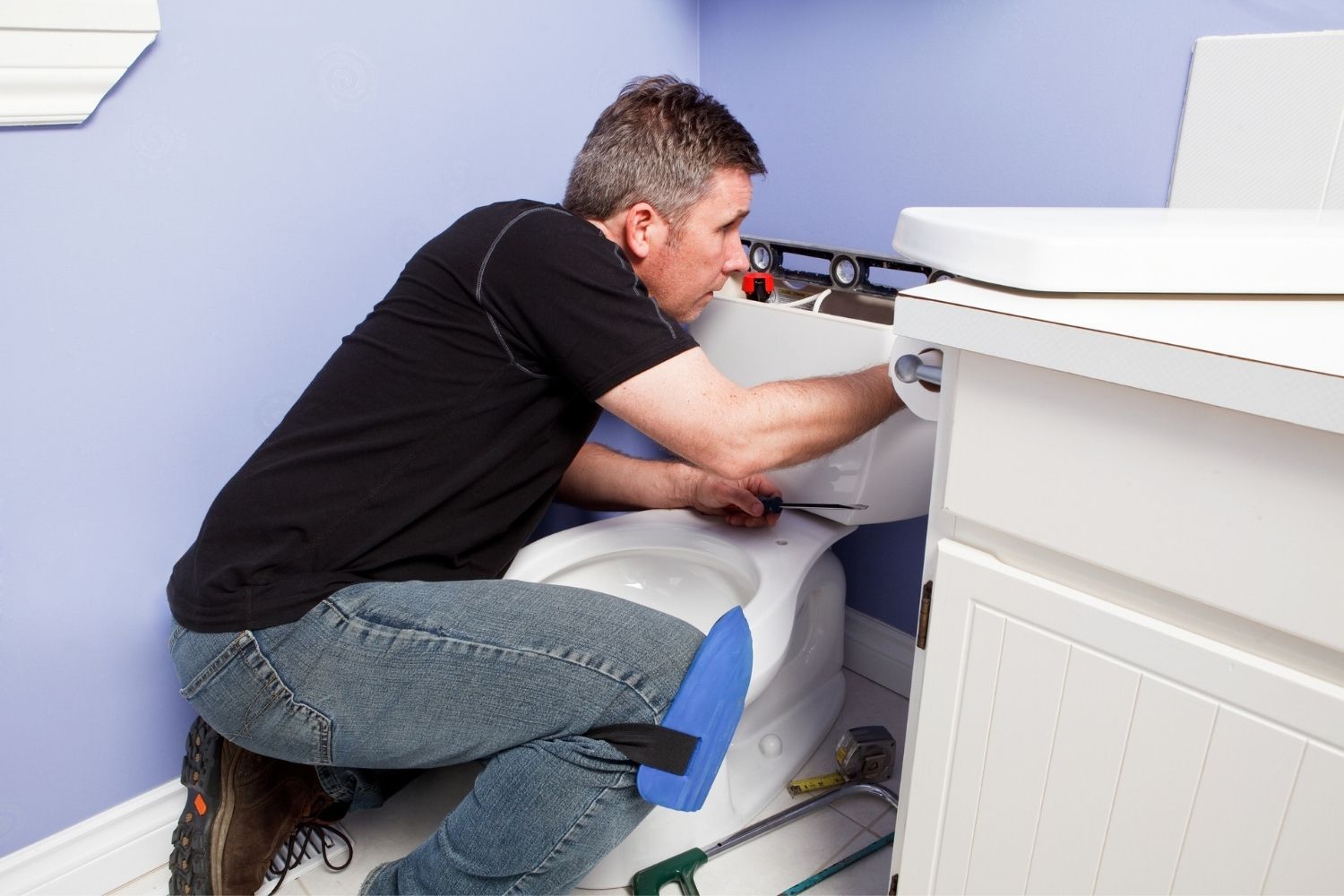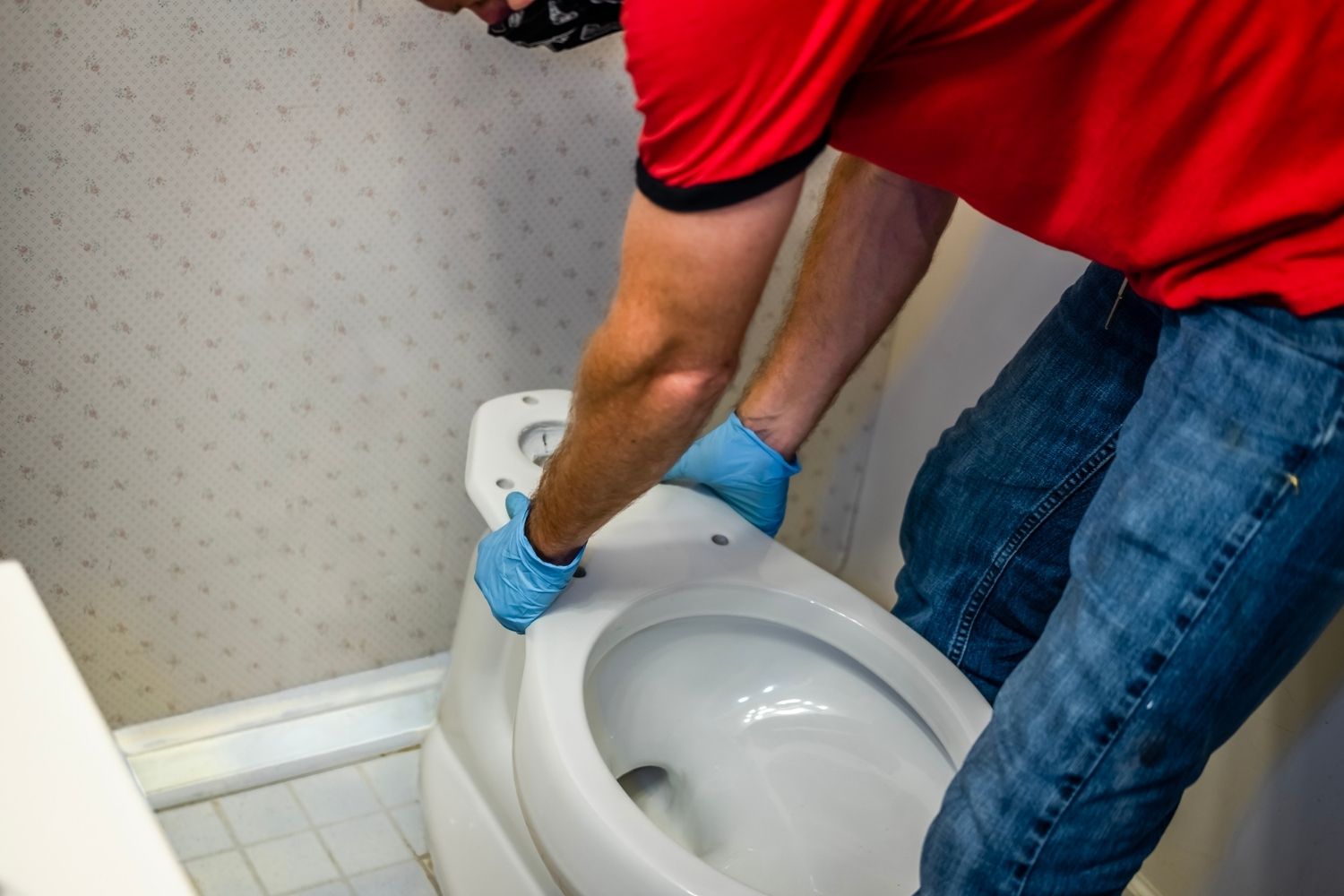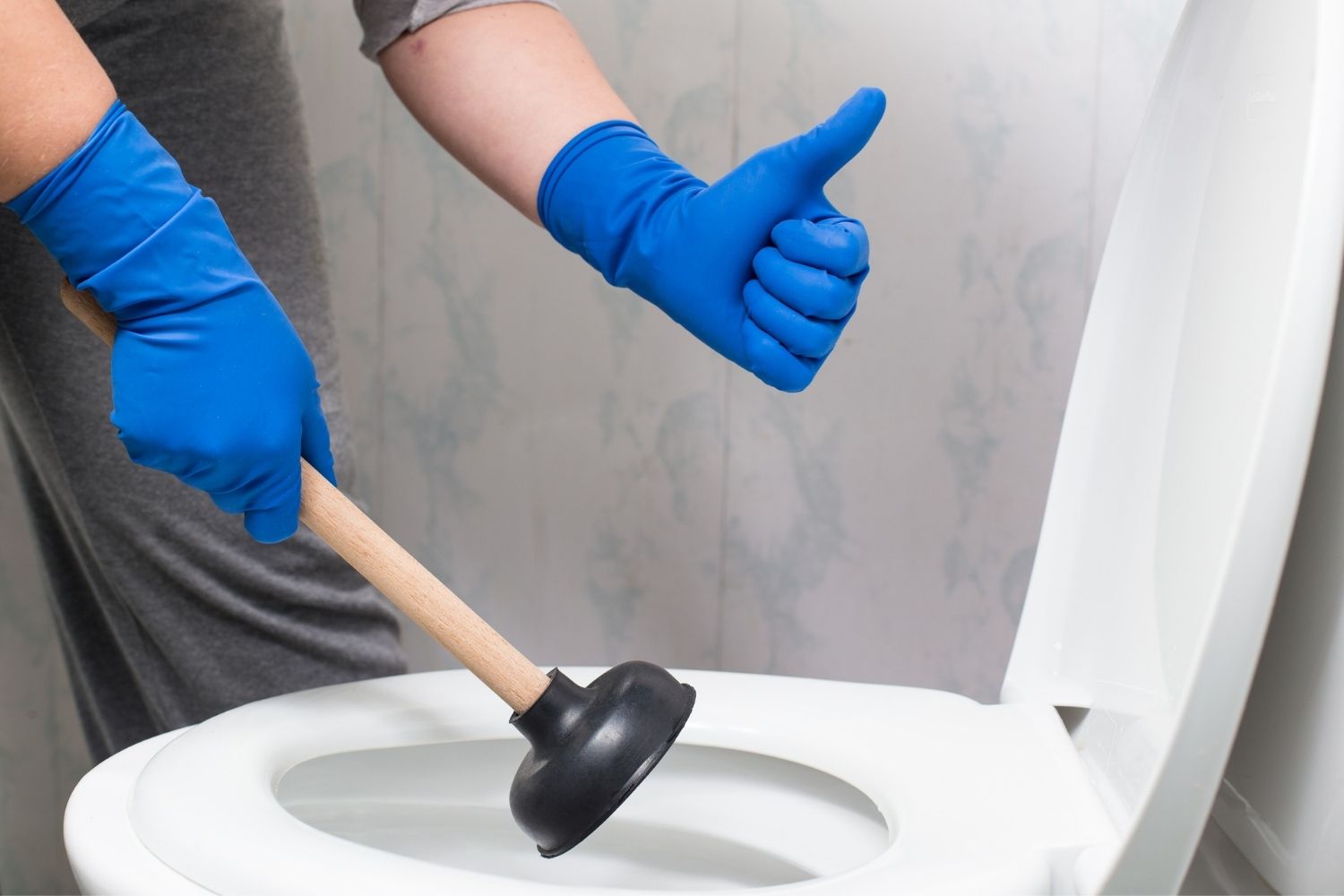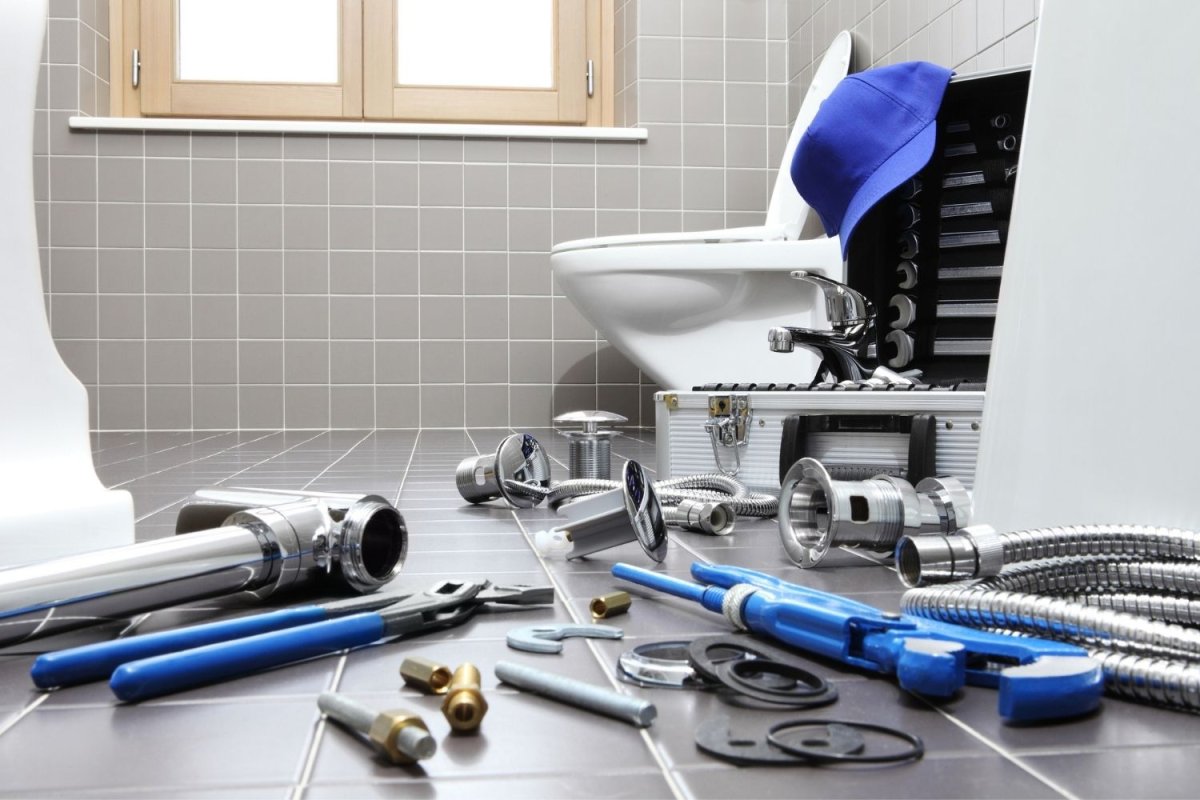We may earn revenue from the products available on this page and participate in affiliate programs. Learn More ›
- Typical Range: $224 to $532
- National Average: $372
If it’s time for a bathroom remodel, don’t overlook the toilet. Even if it seems like the toilet works correctly, an older toilet will not be as efficient as a newer model. According to HomeAdvisor and Angi, toilet installation costs range from $224 to $532, with the national average at $372. The overall cost depends on the type of toilet and the complexity of the job. It takes approximately 2 to 4 hours for a plumber to install a toilet at a base rate of $65 per hour. If the plumber runs into any unexpected issues after the installation begins, it can raise labor costs by as much as $800. These can include leaks caused by insufficient caulking, a cracked flange that results in a wobbly toilet, a leaky flush valve, or an incorrectly installed wax ring seal. Prices can also go up if you have a toilet on the second floor or if you’re installing a toilet in a basement with no pre-installed plumbing.
Factors in Calculating Toilet Installation Cost
Many factors impact toilet installation costs. Prices can differ from the national average due to additional fees for old toilet removal and disposal, labor, installation, type and brand of toilet, installation location, and job complexity.
Old Toilet Removal and Disposal
The price to remove and dispose of the old toilet is typically included in the overall installation price. Some plumbers can charge an additional $50 to $200 for removal and disposal, so be sure to ask your plumber if this is included in the fee to instal the new toilet.
Labor and Installation
Labor costs can fluctuate due to the time it takes to install the new toilet and how sophisticated its features are. On the low end, plumbers charge around $65 per hour and $125 per hour on average. Some plumbers can charge as high as $350 per hour for emergency visits. When a plumber is installing a new toilet, there is the potential to discover plumbing problems once the old toilet is removed. Pipes may need to be replaced to meet building codes, there could be leaks within the walls or flooring, or the wax ring seal that mounts the toilet to the floor could be broken. These issues will increase the labor and installation costs for the project.
Type and Brand of Toilet
A new toilet can cost between $90 and $1,500 or more, depending on the type and brand of toilet. Homeowners can choose from basic two-piece toilets to high-end toilets, some of which include a bidet, lighting, and music. Some popular toilet options include low-flow toilets at an average price of $510, an upflush toilet at $950, a wall-mounted toilet at $675, and a dual flush toilet at $350. The brand will affect the overall price, whether you decide to install a Kohler, American Standard, TOTO, or Saniflo.
Installation Location
The average price to install a toilet in a basement is $1,695. The additional costs are from installing new plumbing in an area where there previously wasn’t a bathroom. If there is existing plumbing and you’re replacing a toilet in a basement bathroom, the price will be closer to $372. If you’re doing a complete bathroom remodel and moving the location of the toilet, that can run you between $2,500 and $3,500, with many homeowners paying $3,000. Relocating the toilet involves moving water pipes, the vent lines, and the drain. Some plumbers may charge extra if they need to install a toilet on the upper floors.
Job Complexity
Toilet installation will cost more if the job is complex, takes longer than usual, or involves repairs. These factors may be included in the original quote, or issues may come up during the installation that need to be addressed, which will drive up the final price. Make sure to ask for an itemized bill for complex jobs, so you know you’ve been charged a fair rate.

Additional Costs and Considerations
When budgeting for toilet installation costs, it’s helpful to know additional price factors and considerations that can increase the cost of the installation project. Plumber rates and expertise can affect the overall cost, and fees can increase based on whether there are leaks or clogs to be addressed, if new flooring is necessary, if additional labor and plumbing is needed, and whether the job is an emergency installation.
Plumber Rates and Expertise
Plumbers with extensive experience may charge more for their time than less experienced plumbers. Others may specialize in a specific plumbing area, and you may pay more for that service and depth of knowledge. Some plumbers charge by the hour, and others may charge a flat fee. Always check with your plumber to clarify how they charge for their time and expertise.
Leaks and Clogs
The average toilet repair costs between $100 and $250. Repairing leaks and clogs can cost considerably more. If the toilet is leaking, you may have water damage to the flooring or walls. Sometimes the only way to fix a leak is to take apart the toilet and tear out the drywall or floor. Homeowners can expect to pay several hundred dollars if there is a serious clog or blockage to the plumbing system. Occasionally, a plumber will need to replace the drainpipe, replace the wax ring seal, or install a new flange. This means they will need to remove, reseat, and reseal the toilet, and this will result in a higher cost for repairs.
Flooring
If the floor has damage from leaking water, expect to pay $8 to $24 per square foot to replace the flooring. Many homeowners don’t realize the extent of water damage until the toilet is removed from the floor. It’s imperative to repair or replace damaged flooring as soon as possible as it can compromise the home’s structure and potentially lead to mold and mildew growth.
Additional Labor
Extra labor costs can be incurred if work needs to be done after the start of the toilet installation. Additional labor costs can run as high as $800 to repair unexpected leaks, a wobbly toilet, wax ring seal replacement and reseating, caulking, or a leaky flush valve. Water damage, repaired or modified plumbing lines, and substantial clogs can all raise toilet installation costs.
Additional Plumbing
Additional plumbing is needed if you’re tackling a major home improvement project like installing a new bathroom. Some required items include supply lines for hot and cold water and sink and shower drains. If the new bathroom is far away from the existing plumbing, it will cost more in materials and labor.
Emergency Installation and Additional Fees
If your toilet has failed and you need a new one installed as quickly as possible, a plumber will likely charge an extra fee to come to your house after hours, on a weekend or holiday, or for rushed service. If a plumber has to travel far to your home, they may also charge a travel fee.

Toilet Installation Cost: Types of Toilets
Toilet installation costs can vary greatly due to the type of toilet, the brand, and extra features. A new toilet can help save money on your water bill by using less than 2 gallons of water per flush, unlike older models that can use up to 7 gallons of water. You can choose a toilet with a round bowl or an elongated bowl. Elongated bowls are considered more comfortable, and they’re easier for the elderly and disabled to use. Generally, there are four types of toilets to choose from: one-piece, two-piece, wall-hung, or a smart toilet. These types will affect the installation cost and how much time it takes to complete the project.
One-Piece
One-piece toilets typically cost between $150 and $1,500. One-piece toilets have a sleek, modern design, and they’re easy to install and clean. This type of toilet is usually smaller, which makes it an excellent choice for tighter spaces. Because one-piece toilets cost more to ship since they can’t be separated to save space, they cost more overall. They’re typically high-efficiency toilets (HET) and have newer technology.
Two-Piece
Two-piece toilets range in price from $90 to $875. Two-piece toilets are the most popular option for toilet installations. They separate into two sections, with the front and base as one section and the tank as another. These toilets are typically more budget-friendly to repair and install.
Wall-Hung
Wall-hung, or mounted toilets, are affixed to the wall with the tank on the inside of the wall. A wall-hung toilet can cost between $500 and $2,000 or more. Since the tank is inside the wall, this type of toilet is more difficult to repair, but it is easier to clean considering it doesn’t touch the floor. Wall-hung toilets can get pricey, but some homeowners find that they’re a good option for a smaller bathroom space.
Smart Toilet
Smart toilets can run from $1,200 to $13,000 or more, with the average smart toilet costing $4,000. They use less water than conventional toilets, and they can flush without the user having to touch it. Some smart toilets have built-in lighting to make it easier to find in the dark, and they have self-closing lids. More options include bidets, seat warmers, and self-cleaning abilities.
Do I Need a New Toilet?
There are a few red flags when it’s time to replace a toilet. If it’s leaking, needs frequent repairs, wobbles when you sit on it, frequently clogs, doesn’t flush properly, or is decades old, it’s time for a new toilet.
Toilet’s Age
Do you know how old your toilet is? Many homeowners don’t know; they assume that there’s no need to replace it if it’s still flushing. Older toilets are not as efficient as newer models. New toilets use significantly less water, which can save on the water bill. Federal law requires that residential toilets made and sold after January 1, 1994, use no more than 1.6 gallons of water per flush. If you haven’t replaced your toilet since 1994, you need a new one. Many homeowners prefer a dual-flush toilet: a partial flush option for liquid waste and a full flush option for solid waste. This is an excellent alternative for those who want to use less water every time they flush the toilet.
Frequent Repairs
If you’ve frequently needed to call a plumber to repair the toilet, it’s time for a replacement. The price of constant repairs can quickly add up. By replacing the toilet, you can save on repair costs that may soon total more than the price of a new toilet.
Wobbling
If the toilet wobbles or rocks when you sit on it, it’s time to call a plumber. The toilet may need to be reseated, or some bolts may need to be tightened. A wobbly toilet is also a sign that there may be water damage underneath the toilet, and the floor may be rotting.
Cracks in the Tank
If you notice water on the floor around the toilet, there could be cracks in the tank. Leaks result in water damage to the floor and even mold and mildew growth. Don’t ignore toilet cracks; replace the toilet to prevent any further damage.
Frequent Clogging
Frequent clogging is not typical for a toilet. If you have a toilet that clogs regularly, that can be a sign of a serious issue. Older low-flush toilets aren’t as efficient and powerful as they once were and will struggle to flush waste and toilet paper effectively. To solve the problem, replace the toilet with a newer model.
Inefficient Flushing
A newer, more efficient toilet will help save money on the water bill since it uses less water per flush. A toilet typically uses 3 to 5 gallons of water per flush, and a low-flush option uses just under 2 gallons. If you’re environmentally conscious and want to save water and money, a new toilet will help.
Aesthetics
If you have an older toilet with scratches or chips or a color that just doesn’t go with the home’s look, a new toilet can make the space more visually appealing. Scratches on the inside of the bowl make it harder to clean and cause it to look dirty, even when it’s not.

Toilet Installation Cost: DIY vs. Hiring a Professional
Toilet installation can be done as a DIY project, as long as you have the plumbing knowledge, physical strength, and time to complete the installation. If you want to move the location of the toilet or install a new bathroom, it’s recommended that you hire a professional because of the involved and complex plumbing work that needs to be done. If you discover any unexpected issues while replacing the toilet, call a professional to come in and make the necessary repairs or replace any parts. Since you never know what you’ll find once you lift the toilet off the floor, allow some wiggle room in your budget to cover the cost of an experienced and knowledgeable plumber.
How to Save Money on Toilet Installation Cost
Toilet installation costs can be high, and the additional costs associated with the project can quickly add up. One way to save money on toilet installation costs is to install the cheapest toilet, but there are other ways to save without compromising quality.
- Get at least three quotes. Research your local plumbers and request estimates from at least three reputable pros who install toilets.
- Hire a professional. It may seem counterintuitive to spend money on a plumber to install a new toilet, but it can save money down the road when the plumbing installation is done right. If the toilet is installed incorrectly, it will cost more money in repairs.
- Do it all at once. If you have more than one bathroom in your home, you may be able to save money by having all the toilets replaced at once instead of spreading installations out over some time. Many plumbers will charge less per toilet for installation if they install multiple toilets at once.
- Stick to the basics. While the extra bells and whistles that come with a smart toilet are tempting, sticking with a basic one- or two-piece toilet will save a considerable amount of money.
- Ask questions. Don’t hesitate to ask your plumber how you can save money on installation costs. Plumbers may be able to get a discount on the price of a new toilet.

Questions to Ask About Toilet Installation Cost
Asking a professional the right questions about toilet installation cost can minimize miscommunication, save money, and get the desired results. Here are some questions to ask a toilet installation professional.
- Are you licensed? (Some locations may require licensing for plumbers, while others may not. Check with your municipality.)
- Do you offer free estimates?
- Will you come to my house to determine the estimate?
- Do you charge an hourly or a flat rate for labor?
- Are labor costs included in the estimate?
- Is full payment required at the end of the installation, or will you require part of the payment up front?
- Who will install the toilet?
- How long will the installation take?
- Is cleanup included as part of the price quote?
- What type of guarantee or warranty do you offer?
FAQs
Deciding on toilet installation while staying within your budget can be a bit of a challenge. Here are some frequently asked questions about toilet installation to help guide you in your decisions.
Q. How much will a plumber charge to install a toilet?
Toilet installation costs range from $224 to $532, with the national average at $372. Plumbers can charge anywhere from $65 to $350 per hour for labor costs.
Q. How often should I replace my toilet?
It’s recommended to replace a toilet after 25 years. If it’s leaking or showing signs of damage, it should be replaced sooner.
Q. What are the common signs that it’s time to replace a toilet?
Some of the common signs that you need a new toilet are cracks in the tank or bowl, a toilet that wobbles or rocks, frequent clogging, insufficient flushing, damage to the tank or bowl, if it’s decades old, and if you have to make constant repairs.
Sources: HomeAdvisor, Angi, Thumbtack, HomeGuide


